Why & who divided the Vedas, Puranas, Hindu Texts? (In different Yugas)
Namaste friends, how are you doing today? Welcome to #BhagavanBhakthi website / blog.
Bhagavan Lord Sri Krishna (Vishnu) (Rama) blessings to you and your family!
In this website / blog, you will always learn about #Hinduism #Sanskrit language.
Also subscribe to my YouTube channel from this link #BhagavanBhakthi to view videos about #Hinduism #Sanskrit language.
Just before going to “Why & who divided the Vedas, Puranas, Hindu Texts? (In different Yugas)“, let us know a brief, basic and very important information.
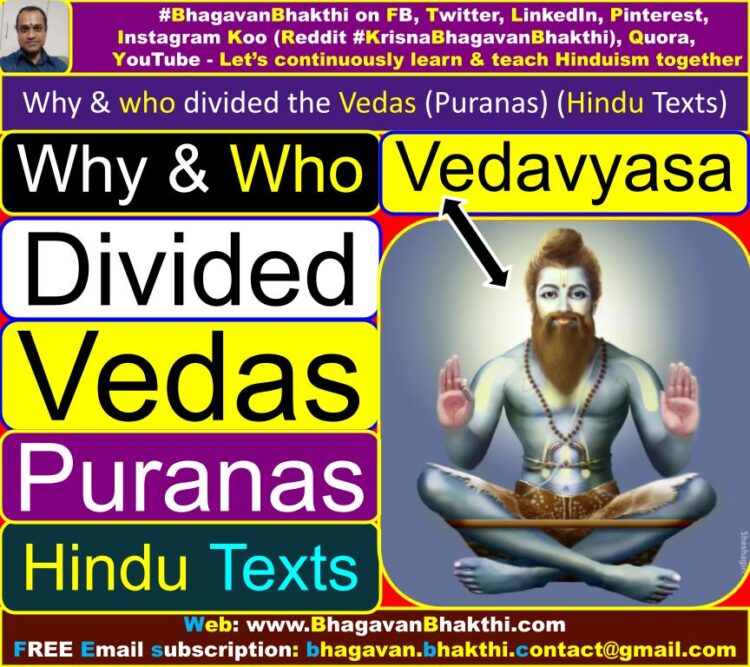
Yes my dear friends, you are right, it was Lord (Sage) Sri Vedavyasa Ji was the one who divided the Vedas, Puranas and other Hindu Texts.
But do you know in every Mahayuga, someone will divide the Vedas, Puranas, Hindu Texts for the better understanding of the same.
[A Mahayuga is the combination of four Yugas, that is, Satya (Krita) Yuga, Treta Yuga, Dvapara Yuga and Kali Yuga.]
Why Vedas (Puranas) (Hindu Texts) were divided?
This is especially because, the people of Kali Yuga will be least knowledgeable and don’t have the capability to understand the Hindu Texts easily.

Thus in every Dvapara Yuga a special and divine personality will be dividing the Vedas, Puranas, Hindu Texts for the easy understanding of the same.
In the post you will learn a long list of such kind of personalities.
In the present Mahayuga, the division of the Vedas, Puranas, Hindu Texts was done by Lord (Sage) Sri Vedavyasa Ji himself.
Lord (Sage) Sri Vedavyasa Ji is an avatar of Lord Sri Vishnu himself and there is no difference between Lord (Sage) Sri Vedavyasa Ji and Lord Sri Vishnu.
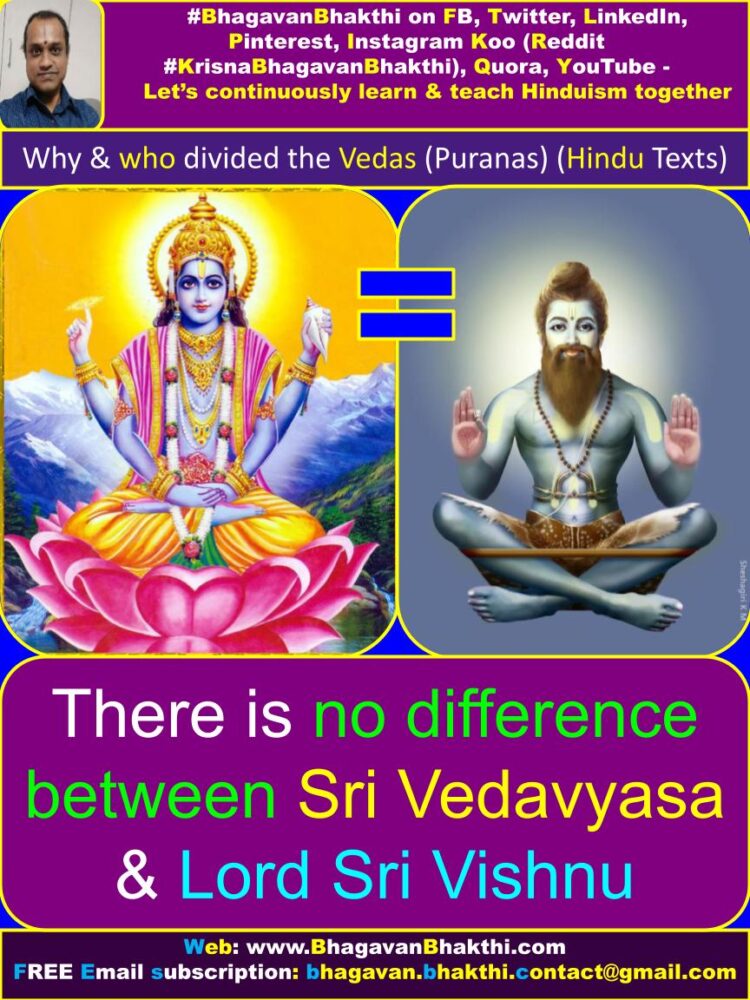
Lord (Sage) Sri Vedavyasa Ji is also known as कृष्ण द्वैपायन (Krishna Dvaipayana), बादरायण (Badarayana), पराशर तनय (Parashara Tanaya), सत्यवती सुत (Satyavati Suta), etc.
Lord (Sage) Sri Vedavyasa Ji is perhaps the one and only one with highest caliber who has the maximum knowledge about Vedas, Puranas, Hindu Texts as he is the direct avatar of Lord Sri Vishnu.
Sri Vedavyasa is reputed not only as the author of the epic Mahabharata, Brahma Sutras, Puranas, etc., but also as the most exemplary Sage of the greatest perfection one could imagine.
Being an avatar (incarnation) of Lord Sri Vishnu himself, Sri Vedavyasa’s powers and knowledge were unsurpassed.
Sri Vedavyasa could see the past, the present and the future at one stroke with highest ease.
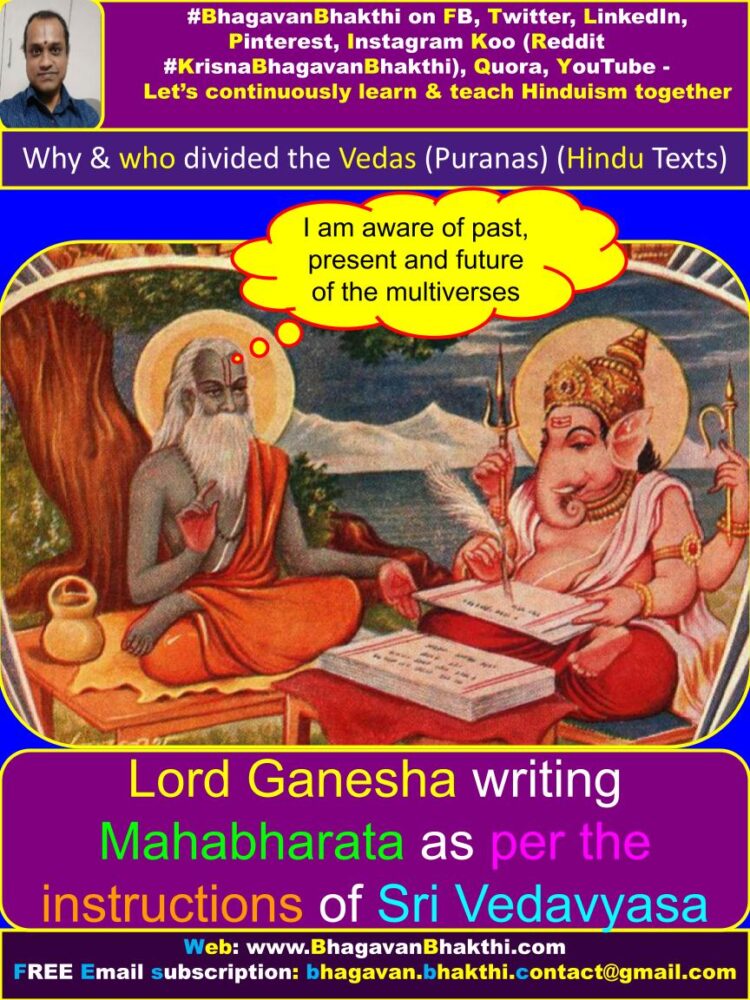
Sri Vedavyasa was a person endowed with cosmic-consciousness. Nothing is unknown to him, at any time, in all the realms of existence.
Sri Vedavyasa is even today is physically present in Badrikashrama (Badrinath) even today along with another avatar of Lord Sri Vishnu called as ‘Lord Sri Badra Narayana’.
We can never imagine the extent of the realization or perfection which Lord (Sage) Sri Vedavyasa has attained. His powers are unparalleled in this unlimited universes.
We should note that, ‘Vyasa’ does not signify the name of any one person. But rather, it is a title.
In every Dvapara Yuga a new Vyasa is born. That Vyasa bears the title Vedavyasa till the next Dwapara Yuga.
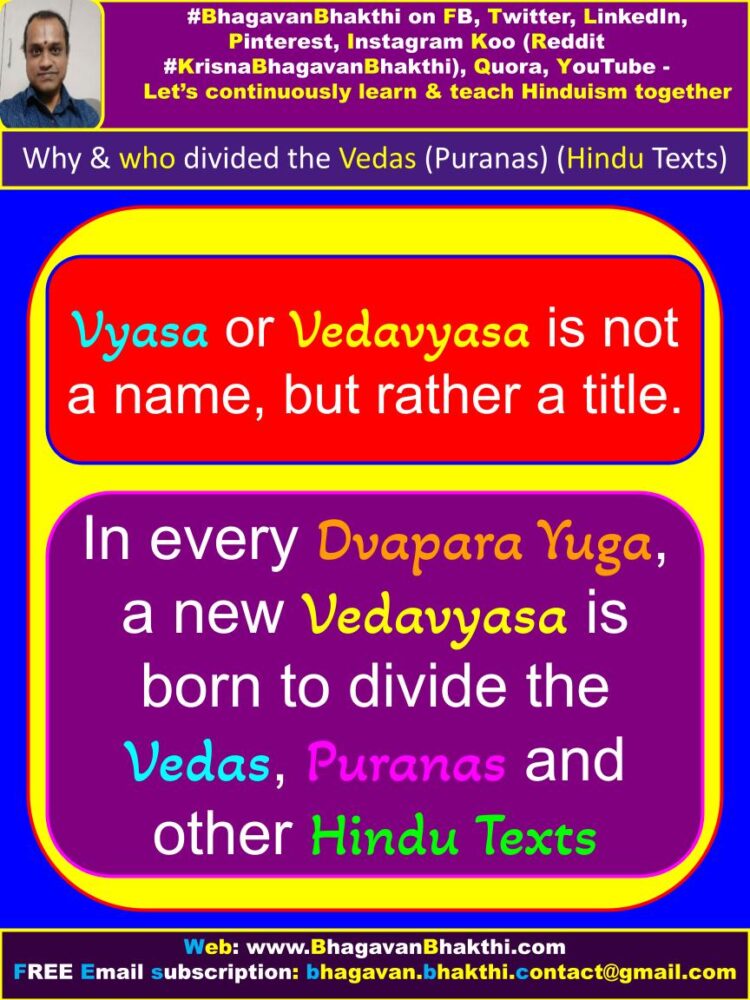
List of the Vedavyasa or Vyasa who divided the Vedas, Puranas, Hindu Texts is as given below:
Lord Sri Brahma Deva : In the first Dvapara Yuga, Lord Sri Brahma Deva himself divided the Vedas, Puranas, Hindu Texts.
Prajapati Vyâsa : In the second Dvapara Yuga, the first Prajapati Vyâsa divided the Vedas, Puranas, Hindu Texts.
S’akra : In the third Dvapara Yuga, S’akra (One of the Lord Sri Indra Deva) divided the Vedas, Puranas, Hindu Texts.
Brihaspati : In the fourth Dvapara Yuga, Brihaspati (Guru of the Devatas / Demigods) divided the Vedas, Puranas, Hindu Texts.
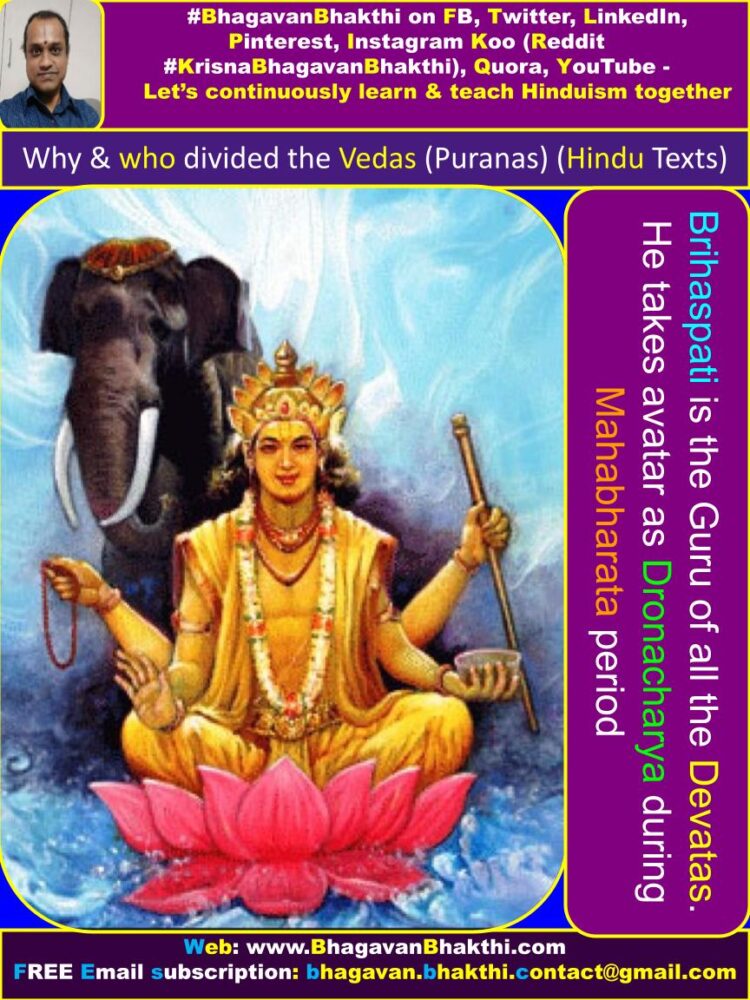
Lord Sri Surya Deva : In the fifth Dvapara Yuga, Lord Sri Surya Deva (The Sun God) divided the Vedas, Puranas, Hindu Texts.
Lord Sri Yama Deva : In the sixth Dvapara Yuga, Lord Sri Yama Deva (The God of death) divided the Vedas, Puranas, Hindu Texts.
Lord Sri Indra Deva : In the seventh Dvapara Yuga, Lord Sri Indra Deva (The King of the Svarga Loka) divided the Vedas, Puranas, Hindu Texts.
Maharishi Vasishtha : In the eight Dvapara Yuga, Maharishi Vasishtha (Lord Sri Brahma Deva’s son) divided the Vedas, Puranas, Hindu Texts.
Rishi Saraswata : In the ninth Dvapara Yuga, Rishi Saraswata divided the Vedas, Puranas, Hindu Texts.
Tridhama : In the tenth Dvapara Yuga, Tridhama divided the Vedas, Puranas, Hindu Texts.
Trivrisa : In the eighth Dvapara Yuga, Trivrisa divided the Vedas, Puranas, Hindu Texts.
Maharishi Bharadvaja : In the twelfth Dvapara Yuga, Maharishi Bharadvaja (Son of Brihaspati) divided the Vedas, Puranas, Hindu Texts.
Antariksha : In the thirteenth Dvapara Yuga, Antariksha divided the Vedas, Puranas, Hindu Texts.
Dharma : In the fourteenth Dvapara Yuga, Dharma divided the Vedas, Puranas, Hindu Texts.
Evaruni : In the fifteenth Dvapara Yuga, Evaruni divided the Vedas, Puranas, Hindu Texts.
Dhananjaya : In the sixteenth Dvapara Yuga, Dhananjaya divided the Vedas, Puranas, Hindu Texts.
Medhatithi : In the seventeenth Dvapara Yuga, Medhatithi divided the Vedas, Puranas, Hindu Texts.
Vrati : In the eighteenth Dvapara Yuga, Vrati divided the Vedas, Puranas, Hindu Texts.
Maharishi Atri : In the nineteenth Dvapara Yuga, Maharishi Atri (Son of Lord Sri Brahma Deva and father of Lord Sri Dattatreya) divided the Vedas, Puranas, Hindu Texts.
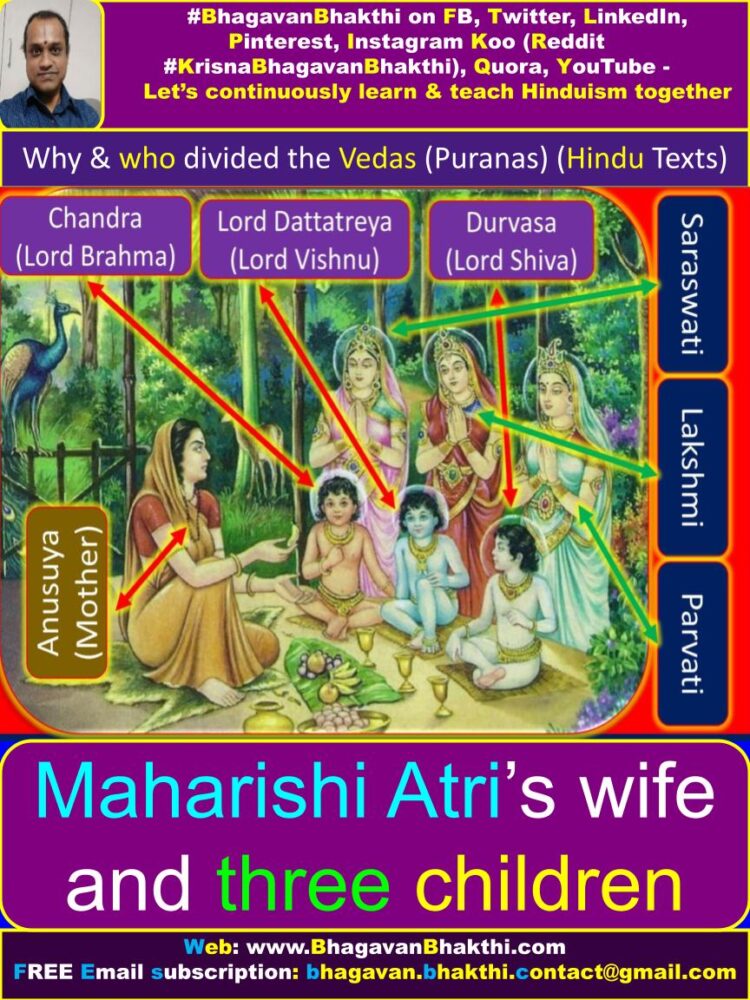
Maharishi Gautama : In the twentieth Dvapara Yuga, Maharishi Gautama (Husband of Ahalya Devi) divided the Vedas, Puranas, Hindu Texts.
Uttama : In the twenty-first Dvapara Yuga, Uttama (An ardent devotee and whose soul was fixed on Lord Sri Vishnu) divided the Vedas, Puranas, Hindu Texts.
Vâjasravâ Vena : In the twenty-second Dvapara Yuga, Vâjasravâ Vena divided the Vedas, Puranas, Hindu Texts.
Soma : In the twenty-third Dvapara Yuga, Soma (Vâjasravâ Vena’s family descendant) divided the Vedas, Puranas, Hindu Texts.
Trinavindu : In the twenty-fourth Dvapara Yuga, Trinavindu divided the Vedas, Puranas, Hindu Texts.
Bhargava : In the twenty-fifth Dvapara Yuga, Bhargava divided the Vedas, Puranas, Hindu Texts.
Shakti : In the twenty-sixth Dvapara Yuga, Shakti (Maharishi Vasishtha’s son) divided the Vedas, Puranas, Hindu Texts.
Jâtûkarnya : In the twenty-seventh Dvapara Yuga, Jâtûkarnya divided the Vedas, Puranas, Hindu Texts.
Krishna Dvaipayana : In the twenty-eight (present timeframe) Dvapara Yuga, Krishna Dvaipayana (Sri Vedavyasa) divided the Vedas, Puranas, Hindu Texts.
Lord (Sage) Sri Vedavyasa’s original name is ‘Krishna Dwaipayana’.
Here ‘Krishna’ means with dark complexion and ‘Dwaipayana’ means as he was born on an island near river Yamuna.
[In Sanskrit Dweepa means island and Ayana means living. Since Sri Vedavyasa was born on an island of river Yamuna, he is called as Krishna Dwaipayana.]
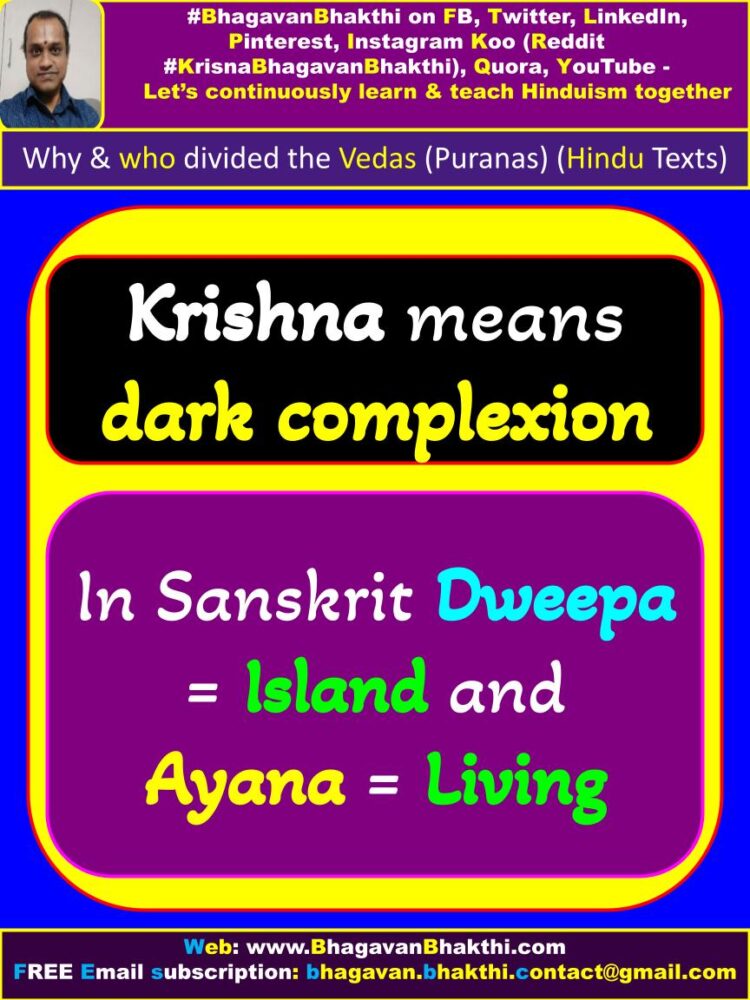
Krishna Dwaipayana is called as ‘Vedayyasa = Veda + Vyasa’ as he divided the Vedas, Puranas, Hindu Texts into different smaller branches.
For example – Veda was sub-divided into four Vedas like : Rigveda, Yajur Veda, Sama Veda, Atharvana (Atharva) Veda.
Similarly Puranas was again sub-divided into 18 Puranas and it’s names are as given below:
Brahma Purana, Padma Purana, Vishnu Purana, Vayu Purana, Bhagavata Purana, Narada Purana, Markandeya Purana, Agni Purana, Bhavishya Purana,
Brahmavaivarta Purana, Linga Purana, Varaha Purana, Skanda Purana, Vamana Purana, Kurma Purana, Matsya Purana, Garuda Purana, Brahmanda Purana.
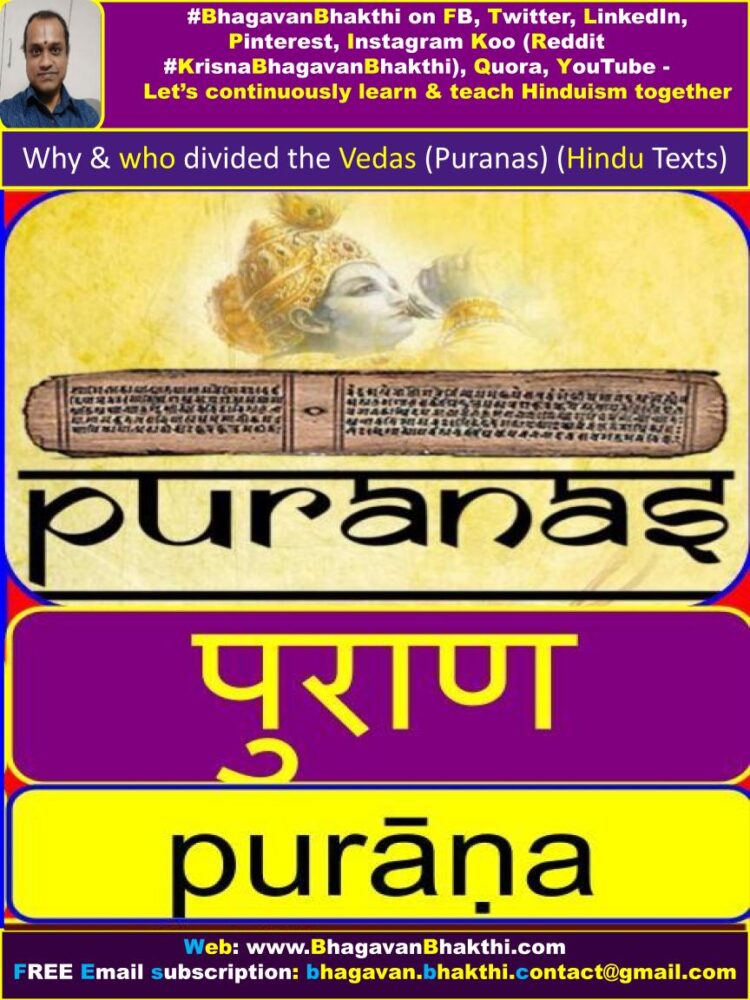
Sri Vedavyasa’s ashrama (ashram) (hermitage) is in Badari (Today’s Badrinath) and he was therefore ‘Badarayana’ (बादरायण) (bādarāyaṇa).
The life history of Sri Vedavyasa is an interesting one. The author of the great epic Mahabharata, Sri Vedavyasa was the first and greatest acharya of Sanatan Dharma.
(We should always remember that, Sri Vedavyasa is an avatar of Lord Sri Vishnu and there is no difference between Lord (Sage) Sri Vedavyasa Ji and Lord Sri Vishnu.)
As said earlier, Sri Vedavyasa is responsible for classifying the four Vedas, wrote the 18 Puranas and recited the great epic Mahabharata.
Actually, the divine epic Mahabharata is often called as the fifth Veda. The most important and the most glorified section is the Srimad Bhagavad Gita.
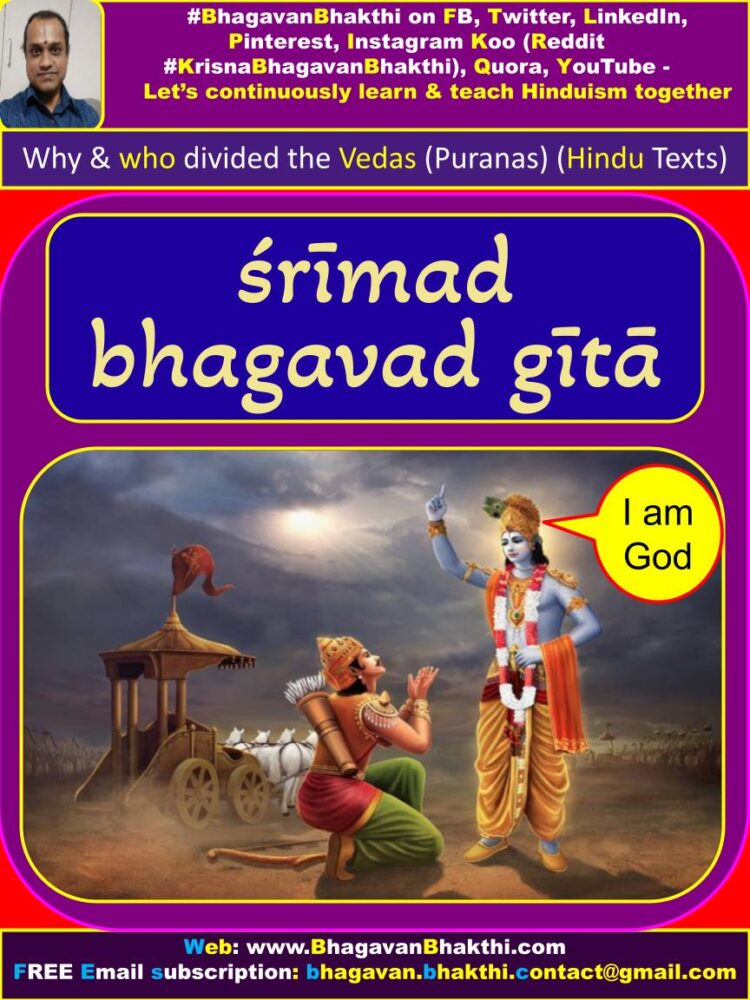
The epic Mahabharata remains a marvel in the divine literature of the world.
Sri Vedavyasa was the sage who gave the world this treasure of authenticity, wisdom, humanness, compassion, etc.
And Sri Vedavyasa is the life-guide to whom seven generations of the high and the humble looked up in hours of sorrow and darkness.
Around approximately 5000 years ago, Sri Vedavyasa was born on an island on the auspicious river Yamuna.
Sri Vedavyasa’s father is Rishi (Sage) Parashara, and his mother name is Satyavati.
Sri Vedavyasa explained that the most important goal in one’s life is to attain Lord Srimann Narayana (Vishnu), that is, the Divine Supreme Personality.
Apart from the Mahabharata, Sri Vedavyasa also composed the Brahmasutra (ब्रह्मसूत्र) (brahmasūtra), one of his shortest theologies on Hindu Sanatana Dharma.
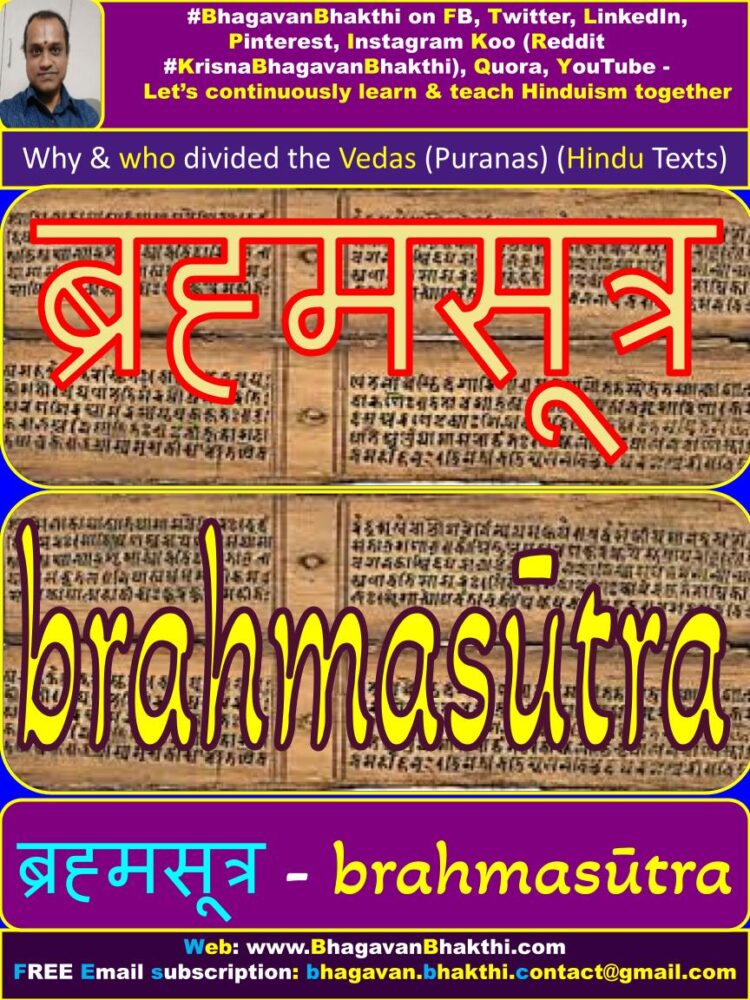
The life of Sri Vedavyasa is an example to all in the modern times on how to be selfless and devote oneself entirely to Lord Sri Vishnu –
in order to attain the final Nirvana, that is, Moksha (Mukti) (Liberation).
More information will be added to his post (article) on regular basis. Please visit again to know the updated information after some time.
To watch videos on #Hinduism #Sanskrit language, SUBSCRIBE to my YouTube channel from this below link:
#BhagavanBhakthi YouTube channel
To know more about “Different Maharishi (Rishi) information, facts, details“, please click the below link:
Different Maharishi (Rishi) information, facts, details
Dear friends, if you need any clarifications about this post, kindly let me know, I will definitely try to answer all of them.
Also your one LIKE, one COMMENT, One Share, one SUBSCRIPTION is highly important.
This will help to know the quality of this content and also it will be helpful to know if any improvements is required for the content.
If you feel this content is useful to you and has helped you to improve your knowledge, kindly share this with your well-wishers.
Because “SHARING MEANS CARING”.
To receive FREE EMAIL SUBSCRIPTION about #BhagavanBhakthi, you can send an email to [email protected] from your email ID.
NAMASTE!
Sri Gurubhyo Namaha
Sri Krishnaayan Namaha
Sri Krishnaarpanamastu
Share in Social Media
Thanks for the unique tips shared on this website.
Well I definitely enjoyed studying it. This information provided by you is very effective for proper planning.